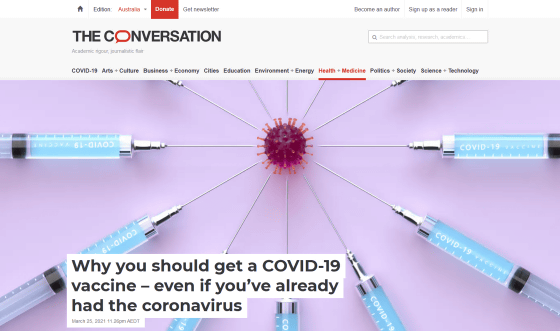Should I be vaccinated even if I have been infected with the new corona in the past?

While vaccination against the new coronavirus infection (COVID-19) is being carried out in each country, 'Should people who have already been infected with the new coronavirus (SARS-CoV-2) be vaccinated?' Some people may be wondering.
Why you should get a COVID-19 vaccine – even if you've already had the coronavirus
https://theconversation.com/why-you-should-get-a-covid-19-vaccine-even-if-youve-already-had-the-coronavirus-155712

After the start of vaccination with the new coronavirus vaccine in the United States, Mr. Greer received a message from a friend, 'What do you think about people who have recently become COVID-19?' Although the friend was eligible for vaccination, he had just been infected with SARS-CoV-2 a while ago and was wondering if he was already immune and needed to be vaccinated.
To consider whether a person who has been infected with SARS-CoV-2 in the past should be vaccinated, it is necessary to know the body's adaptive immune response. An adaptive immune response is a reaction in which the immune system remembers a previously infected pathogen and uses the immune memory to fight when the body encounters the pathogen again. Of proteins that prevent the binding to a bacterial infection or virus antibody and, to indicate the already removal of antibody binding to bacteria and viruses T cells , such as is, it has been deeply involved in the workings of the immune.
When the human body is infected with SARS-CoV-2, the immune system remembers it as a pathogen, and antibodies and T cells acquire immunity to prevent reinfection with SARS-CoV-2. Previous studies have shown that 91% of people who recover from COVID-19 have persistent antibodies up to 6 months, even if they have mild symptoms, and are less likely to re-infect. However, asymptomatic people tend to produce less antibody than those who have symptoms, and it seems that there are individual differences in the immunity that can be obtained by actually being infected with SARS-CoV-2. ..
SARS-CoV-2 everyone after infected with are not necessarily acquire immunity, and human of approximately 9% do not produce antibodies of infected detectable amounts also research results and 7% Studies have shown that people do not have T cells that respond to SARS-CoV-2 30 days after infection. Failure to obtain strong immunity increases the likelihood of reinfection with SARS-CoV-2, and there are rare cases of hospitalization or death on a second onset, Glia said.

While the acquisition of immunity by natural infection varies from person to person, the acquisition of immunity by vaccination is strong and highly consistent.
From these results, Greer states that the COVID-19 vaccine, though not perfect, provides a safer and more reliable defense than innate immunity. In response to a message sent by a friend, he said that he should definitely get the vaccine right now.
Also, a study published after Glia sent a message to a friend found that once a person infected with SARS-CoV-2 was vaccinated, there were six times more antibodies than those who were vaccinated alone. It was reported that it produced. Of course, the vaccine alone can obtain sufficient immunity, so it does not mean that 'it is better to be infected with SARS-CoV-2 before vaccination', but people who have already been infected are vaccinated. Inoculation may provide stronger protection from SARS-CoV-2.
'The immunity gained from natural infections is too unreliable in the face of catastrophic viruses. Current COVID-19 vaccines provide incredibly strong and consistent protection for the vast majority of people. Therefore, even for those who have been infected with SARS-CoV-2, the COVID-19 vaccine offers immeasurable benefits, 'Glia said.

Related Posts:
in Science, Posted by log1h_ik







